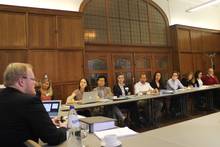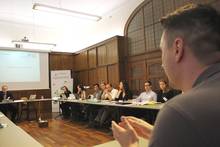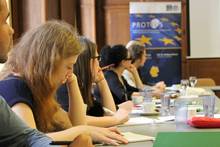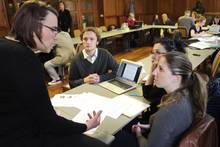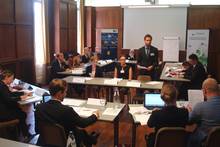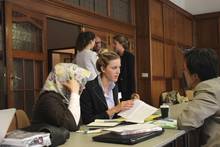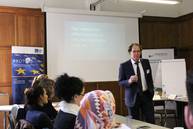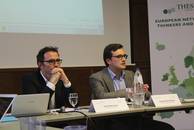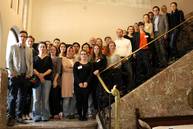

THESEUS Summer School 2015
Justice, Security and Liberty: Conflicting Goals?
Brussels 22/06 - 26/06/2015
From 22 to 26 June 2015, the THESEUS Summer School 2015 took place in Brussels. 20 international students and young researchers discussed the topic "Justice, Security and Liberty: Conflicting Goals?" with renowned experts. The highlight for many participants was the final moot court in which they applied their newly gained knowledge.
"I profited a lot from the THESEUS Summer School 2015, because I got to know the background stories of European security policies from professionals, who have been working in that field for years, sometimes decades", summarized participant Fabian Rohde, University of Cologne, his summer school experience.
From 22 to 26 June 2015, he and further 19 students and PhD candidates listened to a series of expert lectures on the topic "Justice, Security and Liberty: Conflicting Goals?" during the THESEUS Summer School 2015 at the Fondation Universitaire, Brussels. THESEUS Resident Researcher Sarah Leonard, University of Dundee, welcomed the participants in her introductory lecture. She raised the participants’ attention for central questions of European security policies and asked them, what impression they had on the importance of security politics in EU politics.
Carsten Kalla, University of Bonn, opened the second day of the summer school with his illustration of the "perplexities" of freedom, shown by the problems of dealing with data retention between the fields of EU law and national law. He was followed by Saskia Hufnagel, Queen Mary University London, who spoke about the balancing act between liberty and security. In her speech, Hufnagel demonstrated the development of legal frameworks and institutions aiming at fighting terrorism, organizational crime and cyber-crime.
Peter Knoope, International Centre for Counter-Terrorism in The Hague, stressed the need of counter-terrorism policies. He opened his speech with the statement that "something is happening in the world [of terrorism]" and asked for the reasons for rising terrorism and the forming of structures like the IS.
Leonhard den Hertog, Centre for European Policy Studies in Brussels, and Yves Pascouau, European Policy Centre in Brussels, closed the lecture part of the summer school with their speeches on EU migration and asylum policies on the third day. They focused on the tense dynamic between human rights and security. In their speeches, they presented different ways to avoid smuggling and explained the development of the corresponding EU legal framework.
A highlight for the students was the moot court, which took place during the last two days of the Summer School. The students simulated a court procedure at the European Court of Justice. The case dealt with the admissibility and validity of the Directive on data retention 2006/24/EC, which was defined invalid in the simulation due to its violation of fundamental rights. "For me as a political scientist, the moot court was one of the most interesting aspects in my student life so far", said Fabian Rohde. "The topic was so complex that interdisciplinary work was definitely needed." The use of the judicial vocabulary during the simulation was challenging, he said, but interesting. "Also, there were many time frames which we were not allowed to exceed, so we got to know that working under pressure can be very challenging."
Julie Schäfer described the moot court as "great experience". "The intercultural and different subjects that we are studying contributed to two spectacular simulation days, although the co-working between political science and law students was not easy."
Downloads
